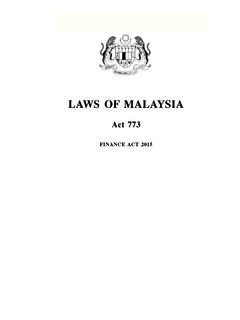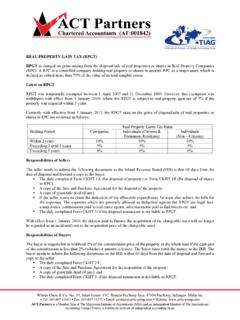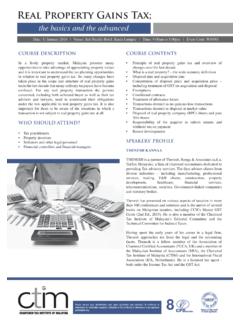Transcription of Impact of the 2018 Tax Law on Real Estate Owners
1 1031 Knowledge 2018 Tax Law Impact of the 2018 Tax Law on real Estate Owners Congress has approved sweeping tax cuts and tax reform that have not been tackled by the federal government in over 30 years (since the Tax Reform Act of 1986.). The tax law, formally referred to as The Tax Cuts and Jobs Act, will go into effect January 1, 2018 . This article has the most up-to-date information along with a summary of how the tax law provisions will affect homeowners and real Estate investors who own all types of investment property . Although this article generally does not delve into tax issues not associated with real Estate , there are many new tax provisions and this is essential information for anyone that owns real Estate to understand.
2 PRIMARY RESIDENCE HOMEOWNERS As a result of doubling the standard deduction to $12,000 for single filers and $24,000 for married filing jointly, according to Moody s Analytics, as many as 38 million Americans who would otherwise itemize may instead choose the higher standard deduction under the new tax plan. The doubling of the standard interest deduction, in essence, removes a previous tax incentive of moving from renting a residence to home ownership. A likely unintended outcome will be fewer Americans choosing to become homeowners versus renting a residence solely for the tax advantages.
3 Any home mortgage interest debt incurred before December 15, 2017, will continue to be eligible for the home mortgage interest deduction up to $1,000,000. Any home mortgage interest debt incurred after this date will be limited to no more than $750,000 qualifying for the home mortgage interest deduction. Beginning 2018 , the deduction for interest paid on a home equity line of credit ( HELOC ) will no longer be eligible for the home mortgage interest deduction. However, the tax law preserves the deduction of mortgage debt used to acquire a second home.
4 This should have a positive Impact on supporting property values in resort and vacation destinations. State and local taxes (referred to collectively as SALT ) can be deducted, but will no longer be unlimited as under previous tax law. The 2018 tax law will allow homeowners to deduct property taxes and either income or sales taxes with a combined limit on these deductions being limited to no more than $10,000. Top earners who live in a state with higher taxes like California, Connecticut, Oregon, Massachusetts, New Jersey, New York will be negatively affected the most by no longer having the previous full federal deduction available.
5 There is the potential for home values in high state tax areas on both the West Coast and East Coast to see a reduction in property values partially due to the new capped SALT deduction at $10,000 and partially due to the new maximum $750,000 home mortgage deduction. A National Association of REALTORS study found there could be a drop in Asset Preservation, Inc. (API) is a qualified intermediary as defined in the regulations under Internal Revenue Code 1031. Neither API, it s officers or employees are authorized or permitted under applicable laws to provide tax or legal advice to any client or prospective client of API.
6 The tax related information contained herein or in any other communication that you may have with a representative of API should not be construed as tax or legal advice specific to your situation and should not be relied upon in making any business, legal or tax related decision. A proper evaluation of the benefits and risks associated with a particular transaction or tax return position often requires advice from a competent tax and/or legal advisor familiar with your specific transaction, objectives and the relevant facts. We strongly urge you to involve your tax and/or legal advisor (or to seek such advice) in any significant real Estate or business related transaction.
7 2018 Asset Preservation, Inc. All rights reserved. HQ | NY | Compliments of: 1031 Knowledge 2018 Tax Law Impact of the 2018 Tax Law on real Estate Owners Asset Preservation, Inc. (API) is a qualified intermediary as defined in the regulations under Internal Revenue Code 1031. Neither API, it s officers or employees are authorized or permitted under applicable laws to provide tax or legal advice to any client or prospective client of API. The tax related information contained herein or in any other communication that you may have with a representative of API should not be construed as tax or legal advice specific to your situation and should not be relied upon in making any business, legal or tax related decision.
8 A proper evaluation of the benefits and risks associated with a particular transaction or tax return position often requires advice from a competent tax and/or legal advisor familiar with your specific transaction, objectives and the relevant facts. We strongly urge you to involve your tax and/or legal advisor (or to seek such advice) in any significant real Estate or business related transaction. 2018 Asset Preservation, Inc. All rights reserved. HQ | NY | Compliments of: home prices up to 10 percent in these and other high state tax areas as a result of limitations in the tax law that won t be as favorable as prior law for some property Owners .
9 Both the House and Senate tax bills had originally proposed increasing the length of time a homeowner would need to live in a primary residence (from five out of eight years versus the current requirement to live in a primary residence two out of five years to qualify for the Section 121 tax exclusion). This proposed change did not become a part of the 2018 tax law. Homeowners will continue to only need to live in their primary residence 24 months in a 60 month time period to be eligible for tax exclusion up to $250,000 if filing single and up to $500,000 if married filing jointly.
10 property Owners will still have the ability to convert a residence into a rental property or convert a rental property into a residence and qualify for tax exclusion benefits under both the primary residence Section 121 rules and also potentially qualify for tax deferral on the rental property under the Section 1031 exchange rules. INVESTMENT property Owners Investment property Owners will continue to be able to defer capital gains taxes using 1031 tax-deferred exchanges which have been in the tax code since 1921. No new restrictions on 1031 exchanges of real property were made in the new tax law.










